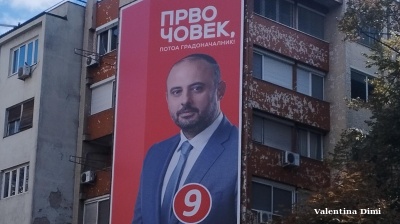North Macedonia has emerged as the top performer in emerging Europe in this year’s Greenfield FDI Performance Index, ranking sixth globally, fDi Intelligence, a specialist division from The FT Ltd., reported on August 12.
With fewer than 2mn inhabitants and a nominal 2024 GDP of about $16bn, the country continues to attract foreign direct investment (FDI) well above its economic size.
It was reported earlier by bne IntelliNews that FDI inflows in North Macedonia reached €1.255bn in 2024, more than double the previous year’s figure. Finance Minister Gordana Dimitrieska-Kocoska announced on February 28 that compared with the record levels of 2022, this still represents a nearly 70% increase.
While manufacturing and business services have traditionally dominated inflows, 2024 brought a breakthrough in the energy sector, fDi Intelligence said.
Dubai-based Alcazar Energy announced a €460mn wind farm project in Stip, 75km south of Skopje, with a planned capacity of 400MW. The project, now ready to build, is set to begin later this year pending financing. According to co-founder Daniel Calderon, the region’s wind resources and cost of capital make such projects viable at around half of current wholesale electricity prices, which averaged €140/MWh in early 2025.
Earlier reports said the project will involve installing 55 wind turbines, supplying clean electricity to around 100,000 households and creating over 600 new jobs.
Once operational, the wind park is expected to produce about 1TWh of electricity annually, making a substantial contribution to North Macedonia’s energy security and sustainability targets.
North Macedonia's Foreign Minister Timco Mucunski was cited as saying that the country’s FDI strategy is shifting from low-cost, labour-intensive projects to high value-added, capital-intensive sectors such as automotive components, medical devices, IT and renewables.
The government’s aim, he added, is to foster structural transformation by linking foreign investors with domestic suppliers, enhancing exports, and aligning with the EU’s Carbon Border Adjustment Mechanism.
Nato membership since 2020 and EU accession talks launched in 2022 add to the country’s investment appeal, though Mucunski said that education reform, infrastructure upgrades, and stronger governance remain critical to sustaining momentum.
News

US, Egypt, Qatar, and Turkey sign agreement to end Gaza war at Sharm El-Sheikh Summit
The US, Egypt, Qatar and Turkey signed a binding peace document on October 13, guaranteeing a ceasefire in the Gaza Strip, marking what President Trump called “perhaps the greatest achievement” of his presidency.

Pakistan, Afghanistan exchange fire along contested Durand Line
Pakistan has claimed responsibility for killing over 200 Taliban fighters in a series of precision strikes along the contested Durand Line.

Trump lands in Tel Aviv as Israeli hostages begin return home
Donald Trump arrives in Israel as the first Israeli hostages are released from Hamas' captivity.

Von der Leyen to confront Hungary’s EU Commissioner over reported espionage attempts in EU institutions
European Commission President Ursula von der Leyen intends to personally discuss espionage allegations with Hungarian Commissioner Oliver Várhelyi, Commission spokeswoman Paula Pinho said at a press briefing in Brussels on October 10.




